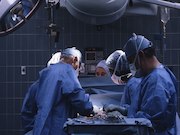Cardiac surgery during flu season is independent risk factor for acute respiratory distress syndrome
WEDNESDAY, Feb. 21, 2018 (HealthDay News) — Undergoing cardiac surgery during the influenza season is associated with increased likelihood of development of acute respiratory distress syndrome (ARDS), according to a research letter published in the Feb. 21 issue of the New England Journal of Medicine.
Geert H. Groeneveld, M.D., from Leiden University Medical Center in the Netherlands, and colleagues compared the incidence of ARDS after surgery during influenza seasons with the incidence of ARDS after surgery during seasons with few influenza cases in a retrospective cohort study involving patients who underwent cardiac surgery between January 2009 and January 2012.
The researchers found that ARDS developed in 5.1 percent of the 740 patients who were admitted to the intensive care unit after cardiac surgery during baseline periods. ARDS developed in 5.6 percent of the 984 patients in the periods between baseline and influenza seasons and in 9 percent of the 289 patients during influenza seasons. All ARDS cases occurred within the first 26 hours after surgery. Cardiac surgery during influenza season, compared with baseline seasons, was an independent risk factor for development of ARDS (odds ratio, 1.85). Compared with baseline seasons, in influenza seasons the duration of mechanical ventilation was significantly longer.
“For the relationship that we found between influenza season and ARDS after cardiac surgery to be of clinical value, research is needed to determine whether perioperative strategies aimed at preventing, detecting, or treating subclinical influenza might reduce the number of patients in whom ARDS develops,” the authors write.
Copyright © 2018 HealthDay. All rights reserved.








